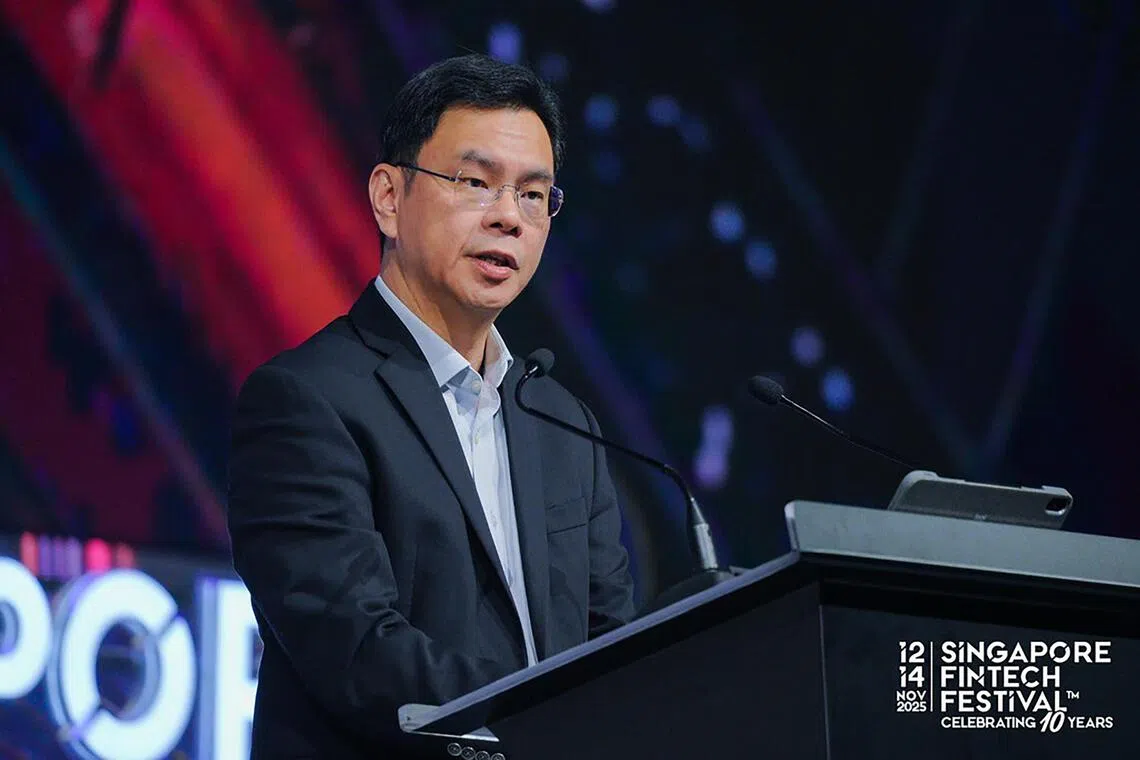A*Star and financial institutions to teach AI to understand Singlish: MAS
Sign up now: Get ST's newsletters delivered to your inbox

MAS managing director Chia Der Jiun said that A*Star and financial institutions will team up to develop a voice-to-text AI model for the financial sector.
PHOTO: SINGAPORE FINTECH FESTIVAL
- A*Star and financial firms will create an AI model to understand Singlish, improving customer service by transcribing conversations with mixed languages.
- MAS published AI risk management guidelines for financial institutions, promoting responsible AI use with principles-based expectations and controls.
- A Gen AI Jobs Transformation Map for the financial sector has identified the impact of Gen AI on key job roles and the upskilling that is needed.
AI generated
SINGAPORE - A*Star and financial institutions will team up to develop a voice-to-text artificial intelligence (AI) model for the financial sector that can understand Singlish so customers here can be better served.
The model will have the ability to transcribe conversations in Singlish and a mix of commonly spoken languages and dialects.
It was announced on Nov 13 at the Singapore FinTech Festival 2025 by Monetary Authority of Singapore (MAS) managing director Chia Der Jiun.
“MAS and our (financial institution) partners have identified our first common problem statement. It turns out Singlish presents a level of complexity that existing large language models are not fully ready to take on,” Mr Chia said during a keynote speech.
“By working together, they (research and development agency A*Star and financial institutions) can pool their data, develop a better model and serve customers better.”
On Nov 13, MAS published a set of guidelines on AI risk management for consultation, as well as an accompanying executive handbook on AI risk management, Mr Chia also said.
This comes after financial institutions have told MAS that they would like more regulatory clarity amid increasing adoption of AI in the sector.
The proposed guidelines will set expectations for financial institutions to identify AI risks and to implement controls across the entire AI life cycle, appropriate to the scale and risk of AI use.
The guidelines will be principles-based rather than prescriptive, Mr Chia added.
He said the momentum of AI adoption and experimentation is building up across the financial sector in Singapore.
At a foundational level, financial institutions are using AI in general work processes such as information search, retrieval, summarisation, first draft generation, speech-to-text transcription and translation of multiple languages.
AI co-pilots have also been tested or deployed in a growing number of specialised functions, such as software development, marketing, customer service, client advisory, analysis of financial markets, credit underwriting and fraud detection.
An emerging area of application is in the use of autonomous agents in more complex processes, including processing credit applications from underwriting to approval and administering standard insurance claims end to end.
“There are also projects to develop consumer agents, collecting information and executing transactions. But agentic autonomy must come with sufficient guard rails,” Mr Chia said, referring to agentic systems that allow autonomy in performing tasks without constant human oversight.
Addressing the risks that AI poses to jobs in the sector, he said the already-published Gen AI Jobs Transformation Map for the financial sector has identified “the impact of Gen AI on key job roles and the upskilling that is needed as these jobs are transformed and augmented by AI”.
“Guided by the map, MAS and the Institute of Banking and Finance are partnering financial institutions to equip their employees with needed AI literacy and skills,” Mr Chia said.
He ended his speech with a reminder that while AI can benefit the financial sector, consumers and businesses, any unchecked use of it can also cause consumer harm and threaten financial stability.
“There needs to be governance and guard rails for safe adoption, and training of the workforce to work with AI,” he said.
“This is what we have set out to do in collaboration with the financial industry.”
The Singapore FinTech Festival, which featured speakers such as Deputy Prime Minister Gan Kim Yong and UOB chief executive Wee Ee Cheong


